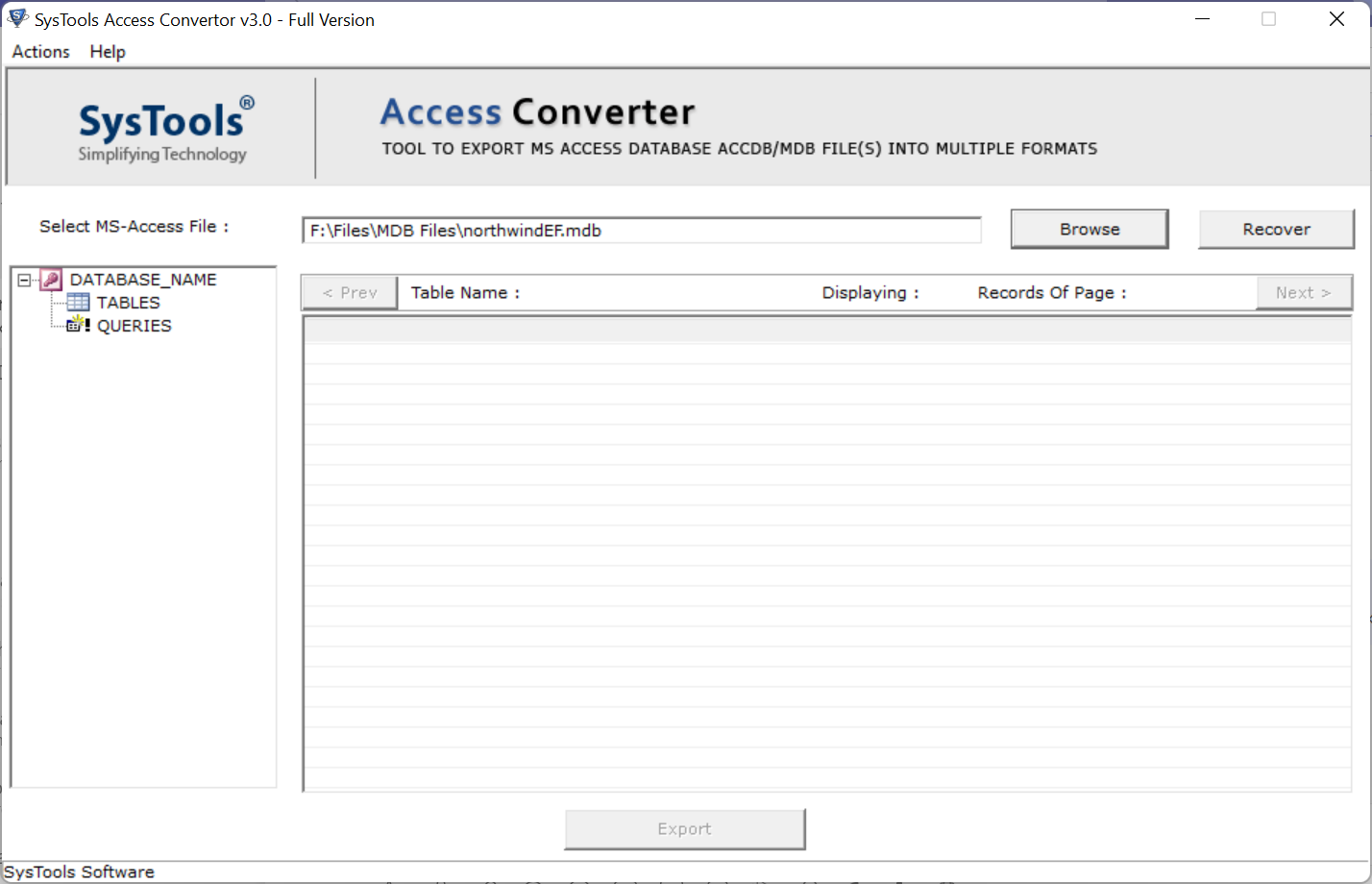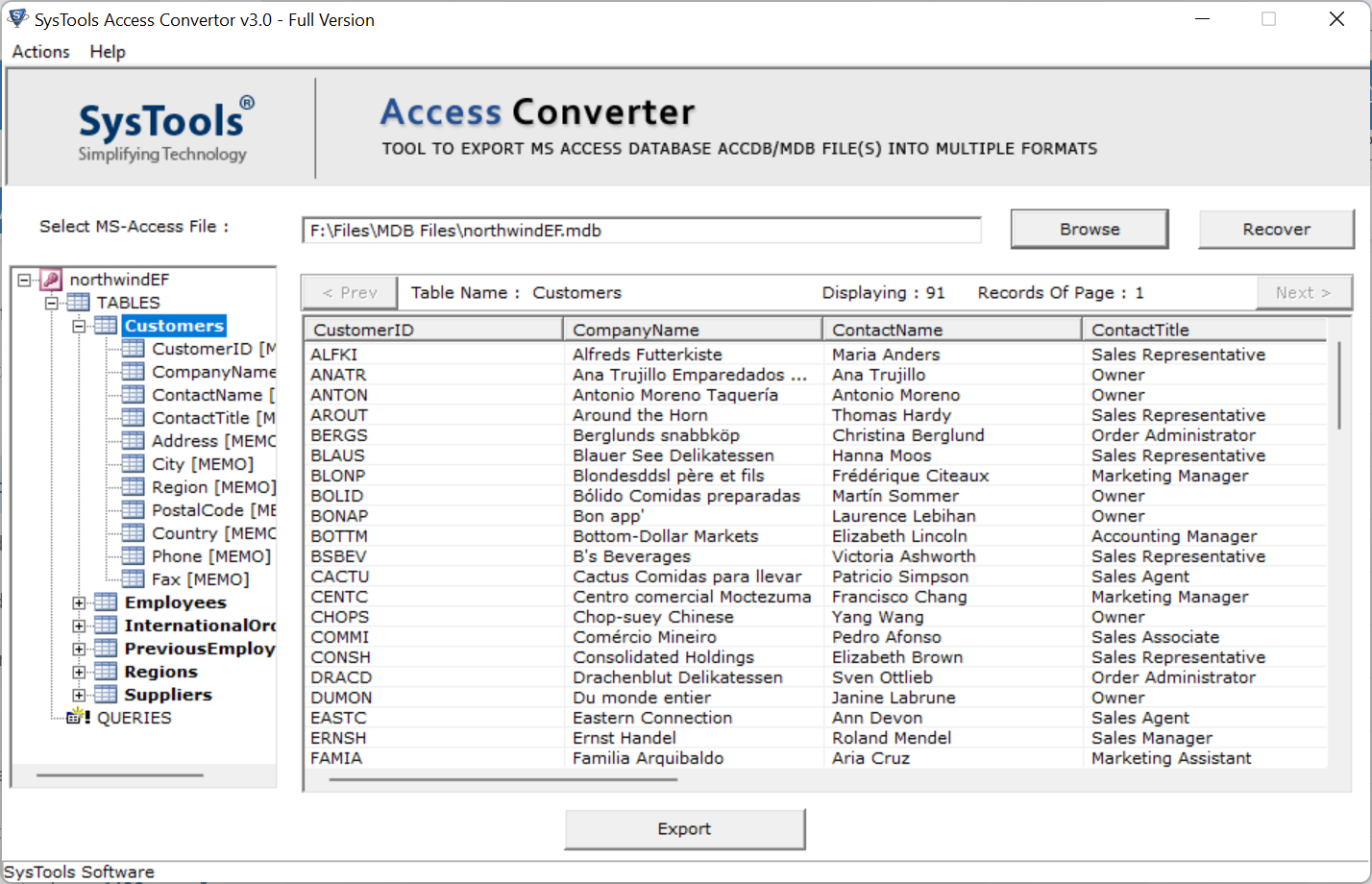Export MDB to CSV File In Just A Few Simple Steps
If you are searching for a reliable solution to export MDB to CSV file, then look no further. This write talks about how to do it along with the reasons why many professionals prefer to convert MDB file to CSV. There are different ways to achieve this task, however, here we mentioned two best of them. So keep reading this article, to decide which method will be more efficient for you.
In Office suite, Microsoft provides a database management service known as MS Access. Allowing users to store their crucial data in an organized way and also analyze large amount of data more efficiently. MS Access stores the data in two formats, MDB & ACCDB. Access Versions till 2003 saves the data in .MDB format whereas version 2007 and above creates .ACCDB files to save data.
Let’s move to solution part!
Why Do Many Users Prefer to Convert MDB File to CSV?
There could be many reasons for users to export MDB to CSV (or Comma Separated Values). Being a native format of Access 2003 and older versions, MDB files are not easy to handle when it comes to analyzing a large amount of data. So, it is better to change MDB data files to CSV format. There are more such reasons like:
- Various applications like Microsoft Excel and Sheets by Google support CSV file format.
- Users can easily Read/Write a CSV file in contrast with an MDB file.
- It uses a tabular structure to store various data information such as numbers, texts, etc.
- Easily runs on any text editor like Notepad, WordPad, Excel, etc.
Export MDB File to CSV Using This Manual Approach
Here we will see how a user can change MDB to CSV file manually. To do this, users are required to have Microsoft Office installed on their local machine. Then we will convert the Access data format to MDB before converting it into a CSV (or Comma Separated Value) file format.
Perform the following steps:
- Step-1. Launch Microsoft Access on the computer.
- Step-2. First step, navigate to the External Data tab.
- Step-3. After that, proceed to the Export option, then click on Text File.
- Step-4. Now choose a desired destination on the local system to save this new file.
- Step-5. Next step, give a name to this file with a .CSV extension.
- Step-6. Finally hit the OK button to convert MDB to CSV.
Limitations of Adopting Manual Approach
- Users must have MS Access installed on their computers.
- It lacks advanced options for more accurate results.
- There is a high risk of data loss when dealing with large amounts of big data files.
- It is a time-consuming process and can take up to hours to finish.
- Issues like file incompatibility may arise when dealing with different versions of MS Access data files.
A Better Way to Convert MDB to CSV Without Access
As we saw above, there are some strict rules to be followed in order to export MDB data files like MS Access must be installed on the system and so on. Therefore, we suggest using a Professional MDB to CSV Converter Tool which is trusted by many industry experts.
The best part about this tool is that users don’t need to install MS Access on their system. Also, it provides a safe and secure environment to do this task. Moreover, it is packed with many advanced features that are not just limited to export MDB to CSV. For example, Export Schema, Export Deleted Data, Export Schema and Data, etc.
Follow the steps mentioned below:
Step-1. Install the MDB to CSV Converter on the computer.

Step-2. Now click the Browse option to Upload the MDB file(s).

Step-3. On the software panel, preview the MDB file data before converting it to CSV.

Step-4. Additionally, if there is any old deleted MDB data then click on Recover to recover it in the new file. Users can choose if they want to export this recovered data as well.

Step-5. After that, hit the Export button and choose CSV format. Then according to the need select to export either Schema or both Schema and Data.

Step-6. Next step, Browse the destination location to save the resultant file.

Step-7. For the final step, click on the Export/Save option to export MDB to CSV.

Some Outstanding Features Offered By This Tool
The advanced features that come in hand with this automated tool makes it the number-one choice for many tech experts. Let’s have a look at some of these prominent features.
- Apart from converting MDB to CSV, there are other formats as well such as ACCDB, Excel and MDB.
- Provides a feature to recover and convert deleted from MDB to CSV file data.
- MDB to CSV Converter is Compatible with all Windows OS versions.
- Export MDB to CSV without losing any single bit of user data.
- User-friendly interface that makes it easier to use for anyone.
- Delivers fast and accurate performance results.
- Repair and convert corrupted MDB files and maintain the data integrity throughout the process.
- This tool works well with MDB files from all versions of Microsoft Access.
Also Read : Open ACCDB in Excel Without Losing Data
Summing It All
In this article, we covered how to export MDB files to CSV format. There are different ways to do this task. After taking all considerations in mind users can opt for the solution that suits their needs. In the manual approach, users are required to install MS Access on their computers to proceed in the process. Moreover, issues like file incompatibility may arise due to different application versions of files. And it lacks many advanced features as well.
Therefore, we suggest using a professional tool like the one mentioned above to get quick results without any data loss. Plus, using the advanced features users can change Access MDB to CSV more precisely.


